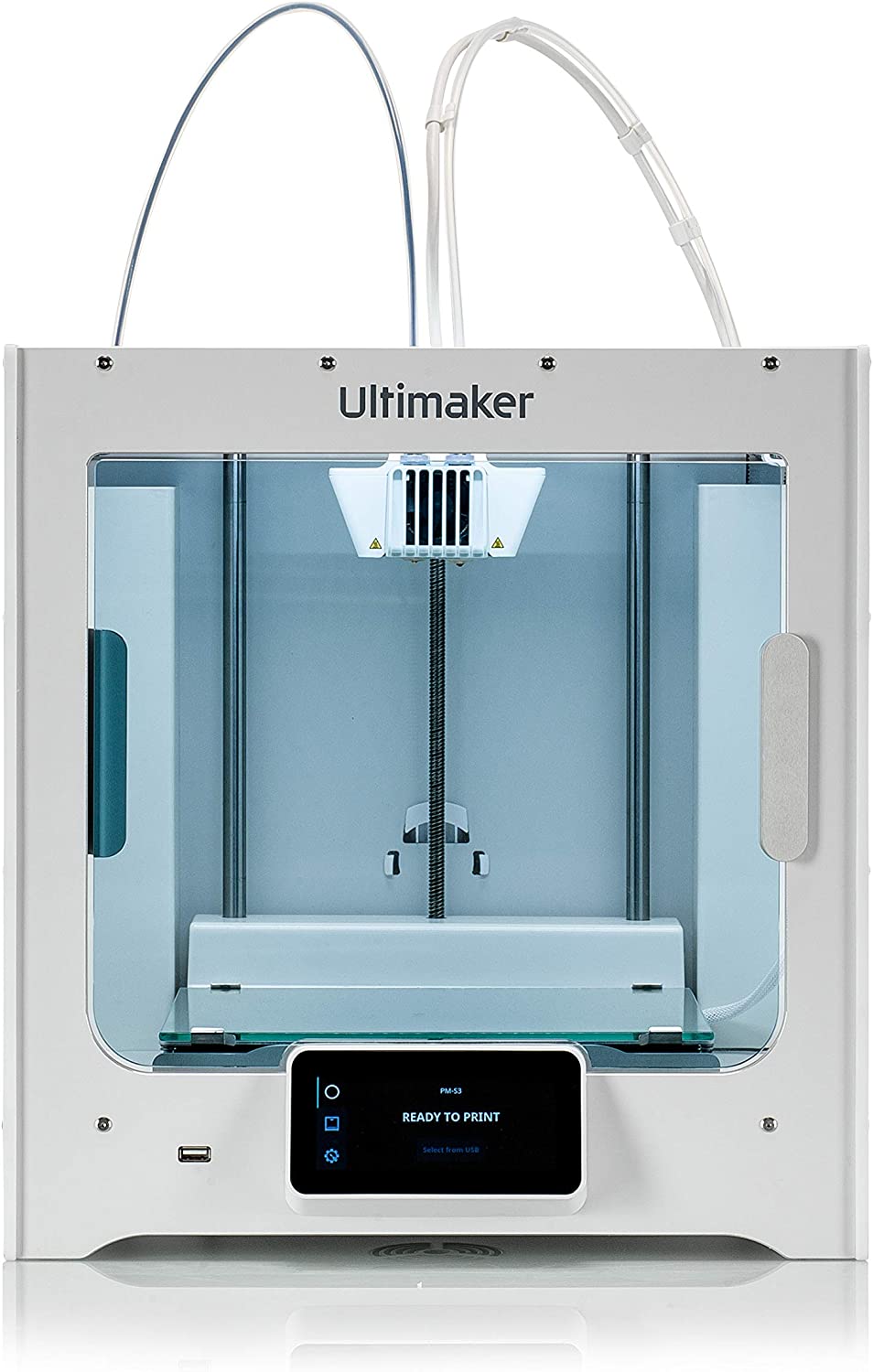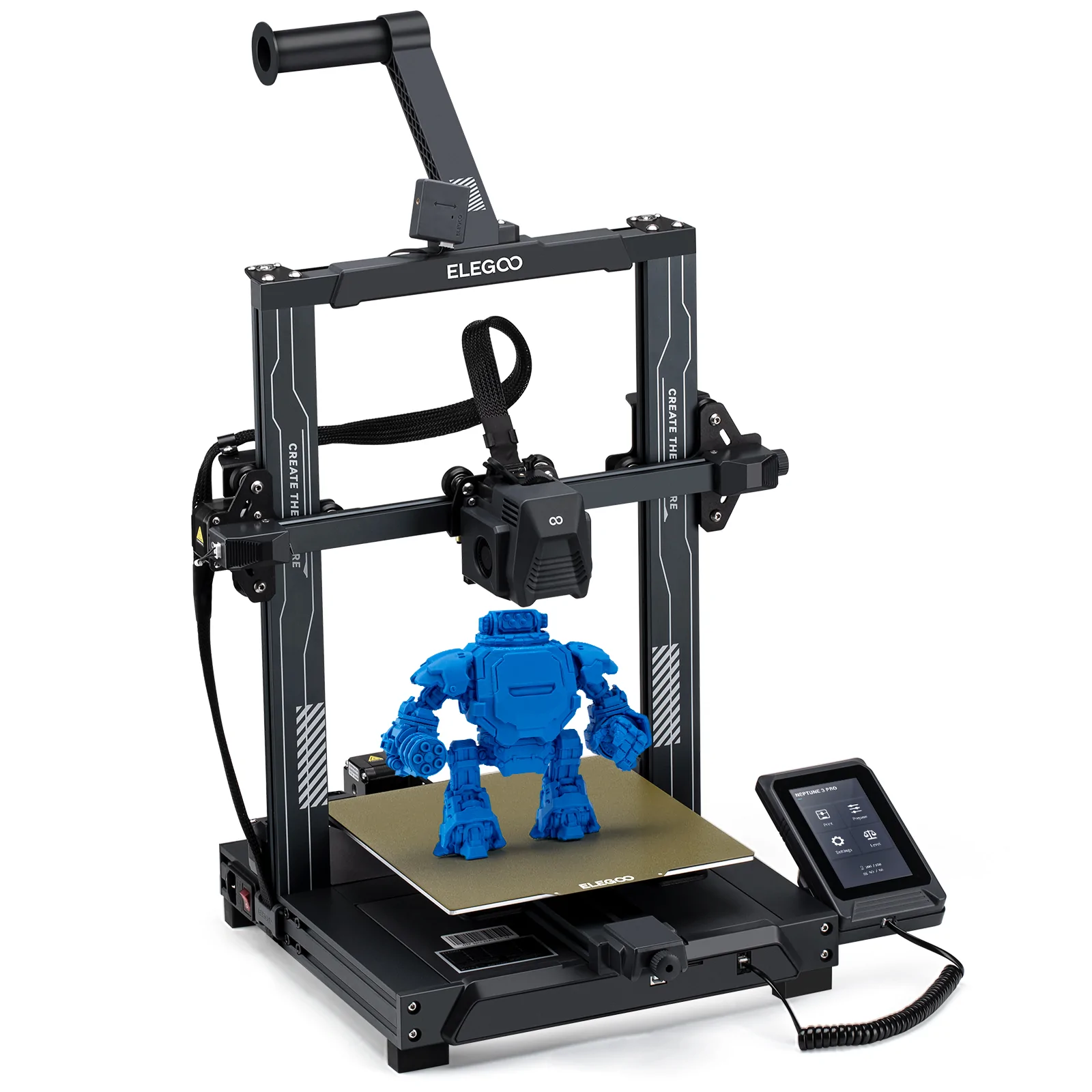Compare S5 vs Neptune 3 PRO
Comparison between the best 3D printers
Choose the best 3D printer at the best price. The cheapest 3D printers are here.
Buy a 3D printer here with 3D Fila.
 |
 |
|
| Model | S5 |
Neptune 3 PRO |
| Printing Material | Filament | Filament |
| Buy Filament for Ultimaker S5 | Buy Filament forElegoo Neptune 3 PRO | |
| Estimated price | $6950,00 | $230,00 |
| Manufacturer | Ultimaker | Elegoo |
| Release Year | 2021 | 2022 |
| Print Volume [mm] | 330x340x300 | 225x225x280 |
| Printer Size [mm] | 495x585x780 | 445x515x475 |
| Weight [kg] | 20,6 | 8,1 |
| Power Loss Recovery | YES | YES |
| Enclosed printer | YES | NO |
| Bed Leveling | Automatic | Automatic |
| Filament End Sensor | YES | YES |
| Bed type | Heated | Heated |
| Power supply system | Bowden | Direct Drive |
| Standard nozzle | 0,4 | 0,4 |
| Maximum Nozzle Temperature [°C] | 280 | 260 |
| Maximum Bed Temperature [°C] | 140 | 100 |
| Maximum printing speed [mm/s] | 80 | 80 |
| Filament holder | YES | YES |
| Camera for supervision | YES | YES |
| Recommended filaments | PLA, ABS, PETG, PC, Nylon, Tritan | PLA, PETG, Tritan, Flex, ABS |
| Recommended slicers | Cura | Cura, Simplify, Slic3r, IdeaMaker e outros |
| Maximum Resolution [mm] | 0,1 | 0,1 |
| Processor | ||
| Display | Display touchscreen 4,7'' | Display touchscreen 4,3'' |
| Power Supply | 110/220V / 500W | 250 |
| Connectivity | USB / Wi-Fi | |
| Operating systems | Windows, Mac, Linux | Windows, Mac, Linux |
| Date of registration in the system | 2022-11-08 | 2023-03-02 |
| Release date | 2021 | 2022 |
| Extra features | The Ultimaker S5 stands out for its easy loading and unloading of materials, automatic bed leveling and excellent print quality with resolutions from 60 to 400 microns. It has dual extruders, interchangeable print cores, advanced connectivity with Wi-Fi and LAN, and intuitive software. It includes a Wi-Fi camera for monitoring, a removable glass bed, and a large build volume, making it ideal for professional and creative environments. | The Elegoo Neptune 3 Pro printer stands out for its easy assembly and automatic bed leveling, ideal for different levels of users. Equipped with a direct-drive extruder and dual gears, it offers excellent adhesion to slippery materials such as TPU. It incorporates dual screws on the Z-axis, ensuring stable prints, and features an integrated task light for improved visibility. With a PEI-coated build plate and a detachable touchscreen, it combines functionality and convenience. The printer also features an efficient cooling system, filament sensor and a simplified user interface. |
| Support for multiple colors and materials (AMS and CFS) | NO | NO |
Notes * |
||
| Cost-benefit | 2 / 10 | 7 / 10 |
| Hardware | 3.6 / 10 | 2.8 / 10 |
| Tela | . | . |
| Print volume | 4 / 10 | 3 / 10 |
| Performance | 1 / 10 | 0 / 10 |
Conclusion |
| In conclusion, the Ultimaker S5 and the Elegoo Neptune 3 Pro cater to different segments of the 3D printing market, each with unique advantages and considerations. The Ultimaker S5, while significantly more expensive, offers a robust build volume, enclosed design, and advanced features such as dual extruders, a wide range of compatible filaments, and top-notch print quality. It is particularly well-suited for professionals and creative environments that require reliability, precision, and versatility in materials. Its advanced connectivity options and addition of features like a Wi-Fi camera for monitoring further enhance its usability in demanding settings. Conversely, the Elegoo Neptune 3 Pro represents an excellent cost-effective option for hobbyists and entry-level users. Its affordability does not compromise essential features like automatic bed leveling, a heated bed, and a direct-drive system, making it an attractive choice for casual users or those new to 3D printing. The Neptune 3 Pro's easy assembly and user-friendly interface also contribute to its appeal, ensuring a straightforward experience without extensive technical knowledge. When considering price-to-performance ratios, the Elegoo Neptune 3 Pro offers a significantly better cost-benefit score, making it a solid choice for budget-conscious buyers. However, for those who require advanced capabilities and are willing to invest more for premium features and capabilities, the Ultimaker S5 stands out as a superior option. Ultimately, the choice between these two printers should be guided by the user's specific needs, budget, and intended applications, as each serves a distinct purpose in the diverse landscape of 3D printing. |

